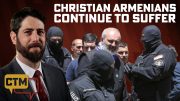A high-ranking communist official who defected to the United States in the 1970s now says the Soviet KGB was behind the tidal wave of “liberation theology” that swept through Catholic countries in Latin America before the opposition of Pope John Paul II effectively ended the movement.
Ion Mihai Pacepa, a former three-star general in Romania’s Securitate, or secret police, said he first learned of liberation theology during meetings with Nikita Khrushchev and General Aleksandr Sakharovsky, then chief director of the KGB, when Sakharovsky accompanied the Soviet premier on a six-day visit to Romania in October of 1959.
“Khrushchev wanted to go down in history as the Soviet leader who had exported communism to Central and South America,” Pacepa said in a May 1 interview with the Catholic News Agency. “Romania was the only Latin country in the Soviet bloc, and Khrushchev wanted to enroll her ‘Latin leaders’ in his new ‘liberation’ war.”
Sakharovsky was little known to the world at large during the “hot years” of the Cold War, when secrecy was so highly valued that not all the members of the British and Israeli governments knew the heads of their own intelligence agencies, Pacepa said. But Sakharovsky played a key role in the East-West conflict as an architect of the export of communism to Cuba, the Berlin crisis and the building of the infamous wall, and the Cuban missile crisis that brought the world to the brink of nuclear war, Pacepa said.
Liberation theology “was born in the KGB, and it had a KGB-invented name,” the former general said. During those years, the KGB had a penchant for “liberation” movements, he noted, citing as examples the “National Liberation Army of Columbia created by the KGB with help from Fidel Castro; the National Liberation Army of Bolivia, created by the KGB with help from ‘Che’ Guevara; and the Palestine Liberation Organization created by the KGB with help from Yasser Arafat.”
The theological movement, Pacepa said, was born in 1960 as a “disinformation” program approved by KGB Chairman Aleksandr Shelepin, the coordinator of the Communist Party’s international policies. The program was designed to give the KGB “secret control of the World Council of Churches (WCC), based in Geneva, Switzerland, and use it as cover for converting liberation theology into a South American revolutionary tool,” Pacepa said. The WCC was a large and tempting target as an international ecumenical organization representing more than half a billion Christians of various denominations in 120 countries.
The KGB created the Christian Peace Council and the World Peace Council, Pacepa said, using them as means to organize South American bishops under a new “theology” that essentially substituted Marxist doctrines of class warfare for Christian beliefs of personal sin and redemption. A meeting of bishops in Medellin, Colombia, in 1968 produced the Conference of Latin American Bishops, whose “undeclared goal was to recognize a new religious movement encouraging the poor to rebel against the ‘institutionalized violence of poverty,’ and to recommend the new movement to the World Council of Churches for official approval,” said Pacepa. “The Medellin Conference achieved both goals,” he said.
As a general in Soviet-bloc intelligence, “I managed the Romanian operations of the World Peace Council,” Pacepa revealed. “It was as purely KGB as it gets. Most of the WPC’s employees were undercover Soviet bloc intelligence officers.” In 1989, the WPC publicly admitted that 90 percent of its money came from the KGB, he said.
Liberation theology flourished through the 1970s, but began to lose steam with the election of Karol Wojtyla as pope in 1978. As John Paul II, the new pope, an anti-communist from the Soviet-dominated land of Poland, began appointing conservative bishops in Latin America whose opposition to communism was a prerequisite to their appointment. The Vatican explicitly rejected the Marxist ideology of the liberation movement in 1984.
The origin of liberation theology has often been attributed to the writings of the Peruvian priest Gustavo Gutiérrez, who preached salvation through the correction of social and economic injustices.
“I recently glanced through Gutiérrez’s book, A Theology of Liberation: History, Politics, and Salvation, and I had the feeling that it was written at the Lubyanka,” Pacepa told the Catholic News Agency, referring to the KGB headquarters at Lubyanka Square in Moscow. “No wonder he is now credited with being the founder of liberation theology.”
Photo of the Lubyanka building, former KGB headquarters




